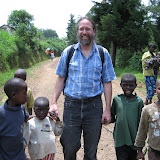Rwanda photos
Here is a quick selection of random photos from Rwanda (click on the photo to go to the album).
Kigali Memorial Centre
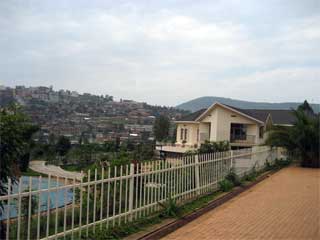 On the way out of town we stopped at the Kigali Memorial Centre. There are several genocide memorial sites around the country. This one was set up in 2004 on the 10th anniversary of the genocide. It is a rather powerful exhibit--describing and documenting what happened, and placing it in context of other 20th-century genocides. There are 10 mass graves on the premises with more than 200,000 bodies--many of them never identified. My time here has been very non-political, and this was the most moving and thought-provoking experience. I'm glad I was able to make the visit.
Leaving Rwanda
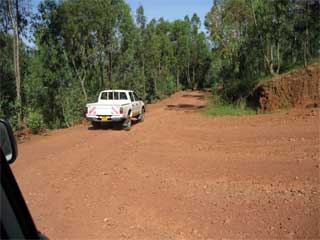 We'll be leaving Rwanda in a couple of hours--flying to Nairobi this afternoon, then a long layover there before an overnite flight back to Amsterdam and then on to Detroit. Two days ago we drove north to visit a coffee cooperative, and then west to Lake Kivu where we spent the night. Yesterday morning we crossed the lake by boat, and late afternoon came back by bus to Kigali. It was dark by the time we returned. We stumbled along unlit, smog-filled, crumbly streets for a kilometer or two back to the hotel. A kid kept brushing behind us trying to open Cheryl's backpack. In contrast, the countryside was so beautiful--particularly around Lake Kivu. Despite the history of genocide and poverty, Rwanda is a surprisingly crime-free country. The kid was more an annoyance than an issue of safety. I have some videos and more pictures I'll try to post later, but right now it is time to go eat breakfast and catch some final things before leaving.
Coffee farmers
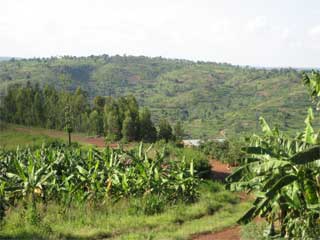 Yesterday we went out east to visit coffee farmers. Today we are going north, staying overnite, then going out west before coming back into Kigali for one last nite before flying out to Nairobi and back thru Amsterdam to the States. The countryside is very beautiful. We got back in late last nite and are leaving early this morning, so this is all there is time for...
Coffee
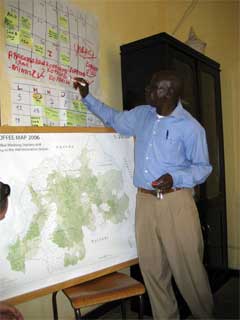 We are meeting today with government officials in Kigali about Rwanda's coffee production. We hear about issues facing cooperatives. Tomorrow we will go out to the countryside to visit the cooperatives themselves. Kigali is very spread out, and seems a bit like a rural city. We're in the city center, but it is not as much of a center as you would expect for a capital city of 600,000 people. The weather is quite nice and comfortable. Occasionally rains come thru and it always seems a bit hazy. But it is nice sitting outside working on the computer. We're going off in just a bit to meet with a bank. Then I think we're done for the day, though getting food at a restaurant always seems to take about 3 hours.
Kigali
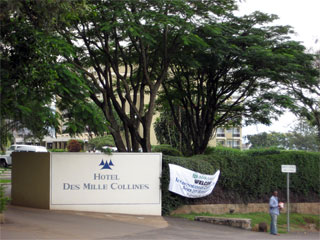 We are now in Kigali at the Iris Guest House, up the street from the Hotel des Mille Collines made famous as the refuge in the 2004 movie Hotel Rwanda. Mostly we've been hanging out, but the difference between the city and the countryside quickly becomes quite clear. Kigali isn't as nasty as some third world capital cities, but poverty is always more desperate in cities than in rural areas. Begging kids are more aggressive and less friendly. Thursday mornings are for gacaca (pronounced ga-cha-cha) courts. Based on traditional justice systems, communities come together to hear testimony and decide on punishment for cases coming out of the genocide. I would have loved to have sat in on one of these sessions, but our hosts laughed off the idea. Everything said in the court is transcribed out longhand, which means that proceedings can move rather slowly. Everything is in Kinyarwanda, which means that I would not be able to understand what is happening. But it does seem as if it would be an interesting experience. Our traveling companions have all arrived, and tomorrow we set off to visit coffee cooperatives--the purpose for the second part of this trip.
Rwanda
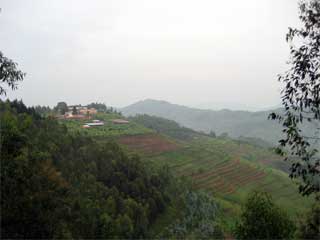 The word Rwanda elicits in most people’s minds images of unthinkable genocide. It is rather curious how initial encounters so thoroughly shape visual images of a place. For example, I studied in Guatemala without knowing a lot about the country and I will always think of it as the most beautiful country in the world. In contrast, I studied Colombia’s history long before making my first trip there and I will always think of it as one of the world’s most violent countries, even though Guatemala has an equally violent history and Colombia is perhaps equally as beautiful as Guatemala. If it were not for the 1994 genocide, what image would we have of Rwanda? Perhaps not much of one. It is one of the smallest countries in Africa, tucked in the middle of the continent. It has not been much studied or visited by outsiders. Perhaps we know of Gorillas in the Mist. That, perhaps would not be a bad image, for Rwanda indeed is (like Guatemala) a stunning beautiful country. The land of a thousand hills. We arrived in the airport the morning of February 14, and our hosts were waiting for us with bouquets of flowers. We were immediately whisked away to Muramba, three hours from the capital city of Kigali over increasingly rough roads. I want to stay awake to watch the scenery pass, but the overnight flight from Amsterdam left me exhausted so I immediately fall asleep but the curvy mountain roads jerk me back awake and so I spend three hours neither asleep nor awake. Rwanda has one of Africa’s highest population densities so it perhaps is not proper to call Muramba “isolated,” but it pretty much is off the grid. It is difficult to find on maps. There is no electricity, but the convent where we stay has a generator that runs from about 6-9pm. From that, we recharge the computer and camera batteries. After that, we write by candle light. For having gone thru one of the worst and most mind boggling genocides barely a decade ago, Rwanda seems so ... normal. People laugh, kids run around, life goes on. I die to ask people about the genocide, but I’m completely unclear as to what topics of conversation are ok and which ones are taboo. In addition, most people hear speak Kinyarwanda of which I know nothing. The colonial language (from Belgium) is French, and I am pretty much limited to Bonjour! and Je ne parle pas français. The government recently has added English as another official language, which means that I can have the limited conversation with school kids that they have reviewed in the classroom: Hi, how are you? I am fine, thank you. It seems a bit silly to sit cooped up in a room reading about Rwanda instead of being outside experiencing its reality directly, but that is exactly what I end up doing. Sylvia recommended Mahmood Mamdani, When Victims Become Killers: Colonialism, nativism, and the genocide in Rwanda. It, of course, is an academic treatment. But it does explore different interpretations of the Hutu and Tutsi divisions in Rwanda, and places the genocide in a broader historical context. The more I learn about the Rwanda genocide the more confounded by it I become. In ways, governments or politicians whipping up xenophobic hatreds against faceless enemies whether they be Jews or Mexicans is understandable. In Rwanda, however, an entire country picked up machetes and began killing their friends and neighbors. It was not abstract or impersonal like death camps and detention centers, but immediate and personal. Yet, whatever historical, political, or cultural differences might have existed between Hutus and Tutsis, there has been so much interchange between the two groups that any divisions seem artificial. It reminds me of the Star Trek episode where the half black and half white people could not tolerate the half white and half black people, so they completely killed each other off. But, surprisingly, that is not how Rwanda ends. Somehow, people seem to have picked up the pieces and moved on after perhaps a tenth of the population was killed in a brief three-month period barely a decade ago. Apparently people have put their Hutu and Tutsi identities aside and united as Rwandans. For that reason, it seems unconscionable to give in to my ethnographic curiosity to ask people whether they are Hutu or Tutsi, how they would construct those identities, and how they can explain the genocide. Do we try to learn from our pasts, or let sleeping dogs lie?
Museums
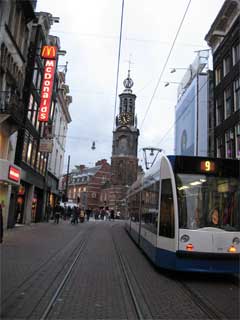 Cloudy, rainy day in Amsterdam. Running around to a couple of museums, and going on a walking tour–trying to see & soak in a bit of the city. Hard to believe we’re leaving tomorrow nite already. It is way too quick of a visit. Still feeling jetlagged. Not so much new. If you want to see more photos, I've uploaded some random ones to http://picasaweb.google.com/marcbecker2/Amsterdam
Roemer Visscherstraat 21
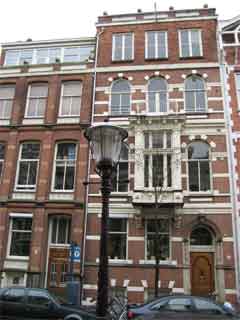 From what I can figure out, this must be the house where I lived in Amsterdam 24 years ago. It’s a couple doors down from the Hotel Hestia where we are staying at Roemer Visscherstraat 7. The entrance is at Roemer Visscherstraat 21 (the door on the right), but the apartment was actually on the fourth floor of Roemer Visscherstraat 19 (on the left) with the balcony and wall of windows. For reasons I don’t remember, we did not use that front room. My apartment was on the back overlooking the youth hostel and the beginning of Vondel Park, the same view now as out of our fourth-floor hotel room a couple blocks down the street. I slept like mom last nite, being awake from midnite to 4 am. Then I finally fell asleep, and when I woke up again it was already after noon. We only made it to one museum today, the Tropenmuseum which has an exhibit on Che. We then went on a canal boat ride. And then the day was over. Time is flying by too quickly.
Singelkerk
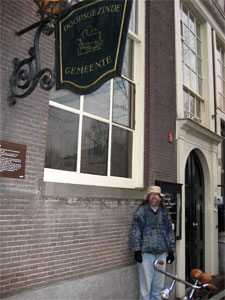 Back in Amsterdam after a 24 year absence. It’s hard to believe it has been that long. Walking around the city visiting my old haunts, including the Singelkerk. It’s strange what seems so familiar and where there are huge memory holes. Singelkerk and Leidseplein seems so familiar. I remember biking every day to work, but I can’t remember for the life of me what route I took. I can’t find the little café off of Leidseplein where I used to go listen to live music on Monday nites. The strangest is that we are in a hotel on the same street where I lived, but I cannot identify in which house I lived. For all I know, it was the same building where the hotel now is. I loved speaking Dutch, and slowly a little bit comes back. We went to the Melkwey to buy Bruce Cockburn tickets for Monday nite. I manage “Ik wil twee karteen voor Bruce Cockburn habben,” which classifies me as a Dutch speaker. But when the agent responds in kind I have to embarrassingly admit that “Ik praaten klein betjie nederlands,” as Cheryl laughs at me. NWA and KLM do codeshares, but KLM provides so much better service. Unfortunately, the flight last nite was run by NWA. I think part of their cutbacks is on oxygen in the cabin, because I show up in Amsterdam sick as a dog. Fortunately, our seats were right in front of the bathroom. It makes for a less than energetic first day back in Amsterdam, as I try to recover my energy. It’s cold and rainy, but hopefully tomorrow will be better.
No camera...
On Friday, we leave for Amsterdam and then Rwanda and I still do not have my camera back from Canon that back in December broke in Ushuaia. I had just bought it in June so it is till under warranty. On their webpage, Canon says that "You can expect the repair to take approximately 7 business days from the time we receive your product." Apparently that is a lie. The Camera Company where I bought the camera says that they never get them back that quickly. We returned the Camera on January 6. Canon finally entered it into their system January 19 (alone more than the 7 days the repair was to take). The Camera Company says that it would take them 10 business days from then, which was last Friday, February 2. Today Canon says that they have finished the repair, and will send the camera in two days. That means they will put it in the mail on Thursday, and we leave on Friday. It's been a month waiting for the camera. So, this means I bought a new camera but now will go on 2 and a half trips without it. Why do companies treat their customers this way? Thanks, Canon, I love you too.
| Marc Becker's Home Page
| marc@yachana.org |
|

